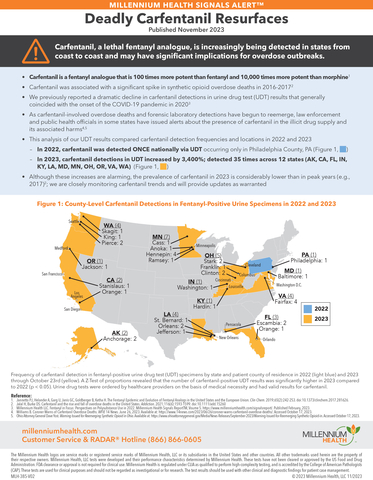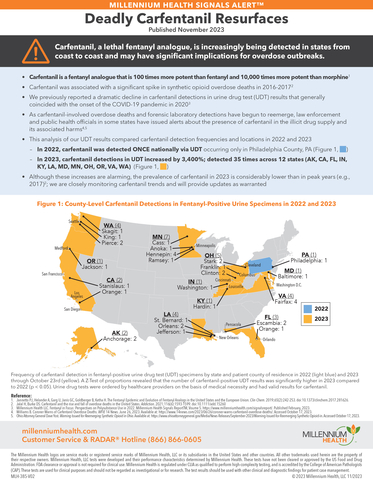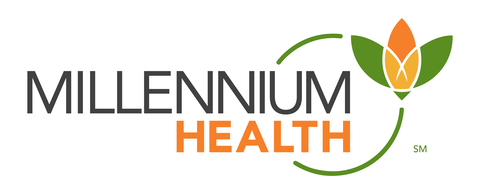SAN DIEGO--(BUSINESS WIRE)--Carfentanil is one of the most potent fentanyl analogues known; 100 times more potent than fentanyl and 10,000 times more potent than morphine. It is used in veterinary medicine as a large animal tranquilizer, but is not approved for human use. Carfentanil’s rapid proliferation in the illicit drug supply was associated with a significant spike in synthetic opioid overdose deaths in 2016-2017, before it decreased and nearly disappeared. Recent reports of carfentanil-involved overdose deaths and increasing forensic laboratory detections prompted Millennium Health researchers to analyze their data for carfentanil detection frequencies and locations in fentanyl-positive urine drug test (UDT) specimens in 2022 and 2023.
- In 2022, carfentanil was detected ONCE nationally in UDT occurring only in Philadelphia County, PA
- In 2023, carfentanil detections in UDT increased by 3,400%; detected 35 times across 12 states (AK, CA, FL, IN, KY, LA, MD, MN, OH, OR, VA, WA)
As multiple data sources now point to the return of carfentanil, law enforcement and public health officials in some states have issued alerts about its presence in the illicit drug supply. “The results of our analysis add to growing evidence that carfentanil may be making a comeback,” said Millennium Health Chief Clinical Officer Angela G. Huskey, PharmD, CPE. “Although any increase in carfentanil detection is concerning given its lethality, the number of detections in 2023 is substantially lower than in peak years. Fortunately, this means there’s still time to increase awareness about its dangers. We are closely monitoring carfentanil trends in our data and will provide updates as warranted,” she added.
A copy of the alert can be accessed here.
About Millennium Health
Millennium Health is an accredited specialty laboratory providing medication monitoring via definitive urine and oral fluid drug tests to support improved clinical decision-making as part of treatment for millions of Americans with chronic pain, mental illness, substance use disorders, and other health conditions. Drug testing is used to obtain objective information about patients’ recent use of prescription medications and/or illicit drugs and helps monitor the effectiveness of treatment plans. We also conduct real-time tracking of emerging drug use trends to help researchers, public health officials, and policymakers address the significant increase in drug overdose deaths.




